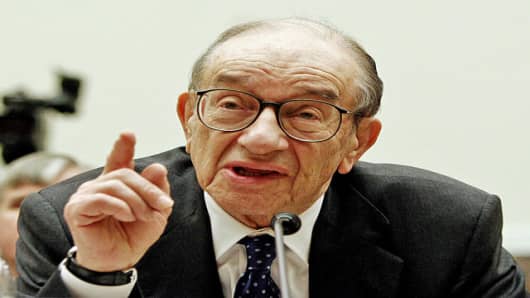Former Federal Reserve Chairman Alan Greenspan told CNBC that he had little to do with the housing bubble or credit crisis despite criticism that the Fed kept interest rates too low under his watch.
In an exclusive interview, Greenspan contended that low interest rates had nothing to do with the runnup in housing prices and subsequent collapse of the market. Housing prices, he contended, would have gone up anyway whether or not short-term interest rates were low.
"What is fairly clearly the case from the data, is that if adjustable rate mortgages weren't available, the purchases (of homes) still would've occurred," he said.
Under Greenspan the Fed cut rates from 6.5 percent in late 2000 to 1.0 percent in mid-2003.
Greenspan said the cuts were aimed at increasing liquidity in the financial system and heading off deflation, not boosting the housing market.
“The reason that we were lowering rates wasn’t to spur housing demand,” Greenspan said. “Indeed, it was already being spurred by the fact that long term rates – which is the driver of housing – were low.”
"I have no regrets on any of the Federal Reserve policies that we initiated back then," he said, though he acknowledged that the central bank couldn't always know the full consequencies of its policies.
"If we can get forecasts right 60% of the time, then we're doing extraordinarily well," he said. "In retrospect: Do I think it would've been nice to have a higher record of forecasting accuracy? Of course. Do I think that it's possible? No."
When asked about the current state of the economy, Greenspan said "we are in the throes of a recession" but that it was too early to tell how deep it would be.
“We have not confronted a situation like this in over half a century," he said. “And we don’t know the dynamics because we have no real information. What we are looking at is basically a tug of war between the real economy--both in the United States and the rest of the world--and the financial systems.”
Greenspan said the Bush administration should look back to the 1980s savings and loan crisis for lessons on settling the housing crisis by committing taxpayers' money to the project.
"I think if you're going to deal with a situation like this it's an issue for appropriated funds of the Treasury to set up something like the Resolution Trust Corporation, which as you remember was very successful in resolving the S&L crisis," Greenspan said.
The RTC was set up to liquidate assets of troubled savings and loan associations that had been declared insolvent by the Office of Thrift Supervision.
It operated between 1989 and 1995 and closed or helped resolved hundreds of thrifts, many of which had gotten into trouble through sloppy lending practices.
The Bush administration so far has adamantly refused to commit public money to help settle a housing crisis in which millions of Americans are expected to lost their homes through foreclosure.
Greenspan echoed many of the themes he outlined in an article in Monday's Financial Times.
He wrote that the housing bubble, which inflated between 2001 and 2006, had not been unique to the United States.
"The U.S. bubble was close to median world experience and the evidence that monetary policy added to the bubble is statistically very fragile," Greenspan wrote.
Most other leading central banks followed suit, although not to such low levels apart from the Bank of Japan.
The Fed has been accused of keeping rates too low for too long as it sought to help the U.S. economy following the collapse of internet stocks and the blow to confidence from the Sept.11, 2001 attacks.
But Greenspan noted that U.S. economic conditions were still sluggish as late as June 2003, when the Fed cut rates to the 1.0 percent low.
It began raising them a year later. But even then, he said, monetary conditions were not bubble-making. Instead, Greenspan placed blame for the U.S. housing and subprime mortgage crisis at the door of investors.
"The core of the subprime problem lies with the misjudgments of the investment community," he wrote.
Subprime-mortgage securitisation exploded because it appeared mis-priced and there were few delinquencies and defaults, "creating the illusion of great profit opportunities."
Lenders were then pressed by securitisers for mortgage paper "with little concern about its quality." Greenspan also said he doubts tightening of regulation would have solved the problem.
"The problem is not the lack of regulation but unrealistic expectations about what regulators are able to prevent," he wrote.
--Reuters contributed to this report.


